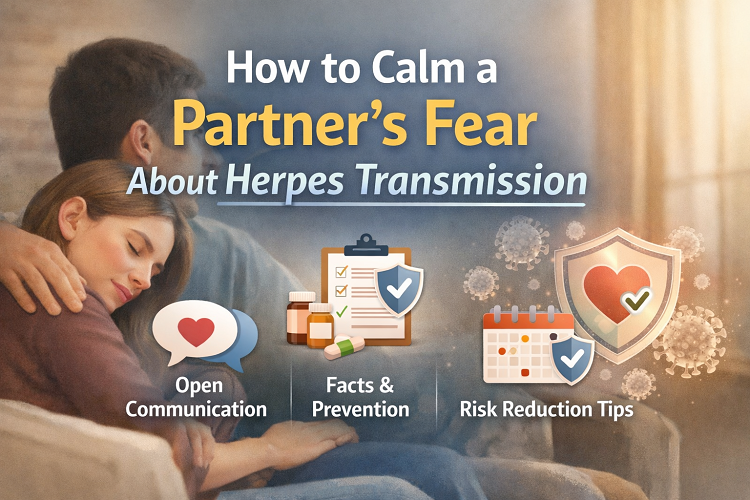Experiencing the first herpes outbreak can be confusing, emotional, and physically painful for many women. Genital herpes, caused by the Herpes Simplex Virus (HSV), is one of the most common sexually transmitted infections worldwide. For females, the first outbreak is often the most intense, marked by symptoms such as itching, burning, painful sores, and flu-like discomfort.
While herpes is a lifelong condition, it’s important to know that it’s highly manageable. Understanding the symptoms, treatment options, and emotional care strategies can empower women to handle the condition confidently. This article will guide you through everything you need to know about your first herpes outbreak — from identifying early signs to getting the right treatment and self-care tips for a faster recovery.
What Causes the First Herpes Outbreak in Females?
Genital herpes is caused by two strains of the herpes simplex virus: HSV-1 and HSV-2. HSV-1 typically causes oral herpes (cold sores), but it can also lead to genital infections through oral-genital contact. HSV-2, on the other hand, is more commonly associated with genital herpes and spreads through sexual contact.
The first herpes outbreak occurs when the virus enters the body, usually through small skin abrasions or mucous membranes during sexual activity. Once the virus settles in the nerve cells, it can become dormant and later reactivate, leading to recurrent outbreaks. However, the first episode tends to be more severe because the body hasn’t yet built immunity against the virus.
Early Signs of a Herpes Outbreak in Females
Recognizing the early symptoms of herpes can make a big difference in getting timely treatment. For many women, the first signs appear within two to twelve days after exposure to the virus.
The initial symptoms often include a tingling or burning sensation in the genital area, itching, or small bumps that soon turn into painful blisters or open sores. Some females also experience swelling, tenderness, or unusual vaginal discharge. These signs may be accompanied by general flu-like symptoms such as fever, body aches, headaches, and swollen lymph nodes.
Understanding these early indicators helps women act quickly, wants medical care, and begin antiviral treatment, which can reduce the duration and severity of the outbreak.
Common Symptoms During the First Outbreak
During the first herpes outbreak, symptoms are typically more intense than in later recurrences. Females may experience multiple sores or blisters that develop around the vagina, cervix, anus, thighs, or buttocks. These blisters eventually burst, leaving painful ulcers that can take two to four weeks to heal completely.
In addition to genital sores, many women experience pain during urination, itching, and vaginal discomfort. Swollen lymph nodes in the groin, fever, and fatigue are also common. Some females might find it difficult to sit or walk comfortably because of the pain caused by the sores.
While these symptoms can feel overwhelming, it’s important to remember that the body gradually builds antibodies against the virus, and future outbreaks are usually milder and shorter.
How Long Does the First Herpes Outbreak Last?
The duration of the first herpes outbreak in females can vary depending on several factors, including immune system strength and whether antiviral treatment is started promptly. Generally, the first episode can last anywhere from two to four weeks.
The healing process begins with the appearance of blisters, followed by ulceration, scabbing, and eventually the regeneration of new skin. Once the sores heal, the virus becomes inactive in the nerve cells but may reactivate in the future. Proper care, medication, and lifestyle habits can significantly shorten the healing period and reduce the likelihood of future outbreaks.
Emotional Impact of a First Herpes Outbreak
For many women, the first herpes outbreak is not just a physical experience — it’s deeply emotional. Feelings of shock, fear, guilt, or shame are common. Social stigma surrounding herpes can amplify these emotions, making it harder to talk about or want help.
It’s important to understand that herpes is extremely common, and millions of people live fulfilling, healthy lives despite having the virus. Talking to a healthcare professional, therapist, or joining online herpes support groups can provide comfort and reassurance. Emotional healing is just as crucial as physical recovery. Remember, having herpes does not define your worth, your relationships, or your future.
Home Remedies and Self-Care Tips
Along with prescribed medication, several home care methods can provide relief during your first herpes outbreak. Keeping the affected area clean and dry is essential for healing. Use warm water to gently cleanse, and avoid harsh soaps or perfumed products.
Wearing loose-fitting, breathable cotton underwear can prevent irritation. Applying a cold compress can help reduce swelling and pain. Some women also find relief using over-the-counter pain relievers such as ibuprofen or acetaminophen.
Stress reduction, adequate hydration, and a nutrient-rich diet can strengthen the immune system, helping the body fight the virus more effectively.
How to Manage Pain and Discomfort
Pain during a herpes outbreak can interfere with daily activities, especially urination or movement. To minimize discomfort, try sitting in a warm sitz bath for 15-20 minutes. This can soothe itching and cleanse the area naturally.
If urination is painful, pouring warm water over the genital area while urinating can help reduce stinging. Applying topical lidocaine ointments or taking prescribed pain relief medication can also be effective. Most importantly, avoid touching or scratching sores to prevent secondary infections and spreading the virus to other areas.
Preventing the Spread of Herpes
Even though herpes is manageable, it’s crucial to take precautions to prevent transmitting the virus to others. During outbreaks, avoid any sexual contact — vaginal, anal, or oral — until all sores are fully healed.
Using condoms or dental dams during sexual activity can reduce the risk of transmission, although it may not completely eliminate it. It’s also important to communicate openly with your partner about your condition and consider suppressive antiviral therapy if you experience frequent outbreaks.
Good hygiene practices, such as washing hands after touching affected areas, are essential in preventing viral spread.
Recurrent Outbreaks: What to Expect
After the first outbreak, the herpes virus becomes dormant in the body but can reactivate due to triggers such as stress, illness, fatigue, or hormonal changes. Recurrent outbreaks are usually less severe and shorter in duration.
Some women experience frequent recurrences, while others may go months or years without one. Maintaining a healthy immune system, managing stress, and taking antiviral suppressive therapy can help reduce recurrence frequency and intensity. Keeping track of triggers can also help manage and predict outbreaks effectively.
Diet and Lifestyle Tips for Managing Herpes
Nutrition plays a crucial role in managing herpes symptoms and preventing outbreaks. A diet rich in vitamins, minerals, and antioxidants helps boost immunity. Include foods high in lysine — such as fish, chicken, dairy, and legumes — as lysine can help suppress viral activity.
At the same time, try to reduce foods high in arginine, like chocolate, nuts, and caffeine, as they may trigger outbreaks in some women. Regular exercise, adequate sleep, and mindfulness practices like yoga or meditation can also support immune function and mental well-being.
Talking to Your Partner About Herpes
Discussing herpes with a partner can feel intimidating, especially after a first diagnosis. However, honesty and communication are vital for trust and safety in a relationship. Choose a calm, private setting to have the conversation.
Explain that herpes is manageable, common, and doesn’t define your ability to have a healthy sex life. Sharing factual information about the virus, transmission risks, and protective measures can help ease concerns. Remember, the right partner will respond with empathy and understanding.
Pregnancy and Herpes: What Every Woman Should Know
If you are pregnant or planning to become pregnant, it’s important to inform your doctor about your herpes status. Genital herpes can pose risks during childbirth, especially if the first outbreak occurs late in pregnancy.
Doctors may recommend antiviral medication during the last few weeks of pregnancy to prevent an active outbreak at delivery. In some cases, a cesarean section (C-section) may be recommended to reduce the risk of neonatal herpes transmission. Proper prenatal care ensures the safety of both mother and baby.
When to want Medical Help
While mild herpes outbreaks can often be managed at home, certain symptoms require immediate medical attention. If you experience severe pain, widespread sores, high fever, or difficulty urinating, consult a healthcare provider promptly.
Women with weakened immune systems (such as those with HIV or undergoing chemotherapy) should want medical care early, as outbreaks may be more severe or prolonged. Never self-diagnose or self-medicate without proper medical advice.
Coping with the Social Stigma
Social stigma is one of the hardest aspects of living with herpes, particularly for women. Misconceptions about the infection can cause unnecessary shame or isolation. It’s important to remember that herpes is a skin condition — not a reflection of character or lifestyle.
Educating yourself and others helps dismantle these myths. Online herpes communities and forums provide a safe space for women to share stories, find emotional support, and connect with others who understand their experiences. Empowering yourself with knowledge is the first step toward breaking the stigma.
Long-Term Management and Outlook
Managing herpes is about more than treating symptoms; it’s about long-term self-care. Staying consistent with antiviral medication, maintaining a healthy lifestyle, and reducing stress can keep outbreaks under control.
With time, many women find that outbreaks become less frequent and less severe. Regular check-ups with your healthcare provider and a proactive approach to sexual health ensure you stay informed and protected. Herpes doesn’t have to hold you back from intimacy, happiness, or a fulfilling life.
Conclusion: You’re Not Alone in This Journey
The First Herpes Outbreak In Females can be a challenging experience, both physically and emotionally. But it’s important to remember — you are not alone. Millions of women worldwide are living healthy, confident, and happy lives while managing herpes.
By learning about your body, following the right treatment plan, and taking care of your emotional well-being, you can regain control and move forward with strength. Herpes may be a lifelong condition, but it doesn’t define who you are. Awareness, compassion, and self-care are the keys to living freely and confidently.



